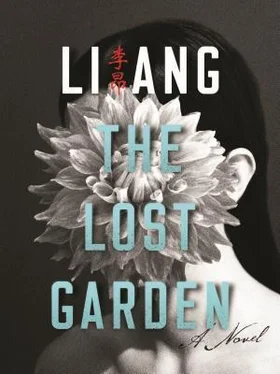Yinghong waited, unsure when to press the button, her palm getting wet and slippery from perspiration, while beads of sweat seemed about to drip down onto the camera any moment. She could not tell if the sweat was caused by her anxiety or the rising temperature; all she could think of was the opportunity presented by the twelve shots. She shouldn’t use them too soon or she might miss precious scenes later; nor should she be too slow and leave some negatives unused.
The wind took a sudden turn, aiding the crackling fire, which had stopped spreading on the low ground and had jumped toward Lotus Garden. Through the Linhof’s lens, which reversed the images, she saw the fire continue to burn on her right, so she was sure it had spared Lotus Garden even though it was spreading fast and fiercely in the strong wind. To her, it was a sure thing that, no matter what happened, even if she were to lose consciousness, she would remember unerringly the direction of Lotus Garden — to her left from where she was standing.
The wind fanned the fire, sending flames higher and higher into the air, until a shocking red blanket of fire spread over the top of the hill and swallowed up most of its greenery. As the fire grew stronger, the thick smoke thinned out, increasing visibility. Through the lens, Yinghong witnessed the splendid sight of a hill burning, prompting her to change the negatives one after the other as she took a quick succession of pictures; she paid little attention to what might follow.
It was her mother who first threw down her camera and ran toward Lotus Garden, shouting for the workers to douse the fire by the fire wall. She was followed by Father, who, with his camera, lenses, and negatives slung over his shoulder, had been taking shots all over the place. Amid the shouts and screams, Mudan ran out of Lotus Garden banging an aluminum washbasin, claiming that it would scare away the fire god. Everyone was thrown into a frenzied panic as they tried to put out the fire, but the tongues of flame continued to follow the wind and licked at Lotus Garden. Bits of dry grass caught fire and sparks flew everywhere. It seemed that in a matter of seconds the flames would sail over the fire wall and land on Lotus Garden’s terraces, towers, and pavilions.
Then as suddenly as it had first changed direction, the wind shifted again and weakened considerably, taking flames along as it raced down the hill, as if trying to catch up on extra work. Isolated small fires burned here and there for days before finally dying out. Father told Luohan and the workers to stand watch day and night; they were not allowed to leave until they’d emptied many buckets of water and were certain there were no more burning cinders.
From the moment the fire was set until the hill was covered in ashes, Father never stopped taking pictures, capturing everything through his lens. Since Mother rushed to help fight the fire, she left many of the thirty-six negative in her Leica unused. Yinghong, however, used up all twelve of her Linhof negatives.
When the negatives were developed, they saw that she was the only one who had captured the moment when the fire was at its most ferocious. Even with black-and-white photos, the leaping flames and flurries of sparks presented a terrifying and striking sight.
Before weeds began to sprout on the barren hill after the fire, Father had the workers plant cassia trees in neat rows, adding small canopies of green to the charred slopes.

“Your father was truly a man capable of squandering the family fortune. He spent all his days in the garden thinking up crazy ideas, so no wonder the family lost everything,” Lin Xigeng commented in his usual willful way. “Whoever heard of someone nearly burning down an entire estate by setting fire to a hill just so he could take pictures?”
Her face darkened at his words.
“Father set fire to the hill because the pandan and the tasselgrass were too dense. We cut the plants down but they grew back, again and again. Besides, isn’t it better now with the cassia trees?”
They were standing outside the garden under the cassia groves that had grown to a height of more than three meters. Their slender, pointed leaves were not dense enough to block out the sun, leaving spaces for the late-afternoon sunlight to slant in. Instead of the famous, blood-red forget-me-not peas, the cassia trees, also called forget-me-not in Taiwan, produced only tiny yellow flowers that sprinkled the area with colorful petals when each breeze swept past.
“I won’t argue with you. I can’t say anything negative when it comes to your father,” he complained softly, then, in an abrupt change of attitude, said enthusiastically:
“Your father meant for you to be born and grow up in this garden, and I, I’m going to help you renovate it so you can move back to live here.”
Caught off guard by his unexpected plan, she looked at him with worried eyes.
“And I want you to marry me,” he declared in a hurried but customary decisive tone.
Under cassia trees laden with yellow flowers, tears welled up in Yinghong’s eyes, only days after the planned abortion of his child.

Father continued his shopping spree for cameras. In the 1960s, before Japanese cameras made it into the international market, Father bought only cameras from Europe, even though he had studied in Japan. His favorite was naturally the Leica, and he could not wait to own each new model as soon as it came on the market.
Besides the latest models, he also began to collect old cameras, and ended up with a few old models of Linhof, Rolleiflex, and Contax. At first he frequented a photography equipment store that catered to professionals in Taichung. After several visits, he became friends with the owner, who, whenever a new shipment arrived, sent a man called Kozo to Lotus Garden with the cameras for Father to have the first pick. During the five or six years that Kozo made his visits, Father collected more than fifty cameras of various makes and models.
The man known by his Japanese name, Kozo, was in his forties and taller than most Taiwanese of the time. He was always dressed in Taiwanese-style shirt and pants that he apparently never changed out of, for the one-time blue fabric looked forever gray, as if it had never been washed clean. Mudan liked to gossip with Yinghong that Kozo was single and had no woman to take care of his needs.
What interested Yinghong most about Kozo was that he rarely wore shoes. He had big feet that were usually covered in dark mud. Yet the shoeless big feet never seemed steady on the ground; when he walked, his rear end swayed from side to side, as if he were walking on tiptoes. She had just learned the expression, “swaying gracefully back and forth,” which reminded her of the way Kozo walked, yet that seemed somehow not to fit a full-grown man.
“Kozo has a sissy way of walking, swaying his hips this way and that,” Mudan often commented.
Yinghong saw quite a bit of Kozo, since he often came to show Father the photography equipment. For years, he was the only visitor to Lotus Garden, and everyone liked him, everyone but Mudan.
Mudan began to ignore Kozo only after she learned that some of his cameras cost the price of one or two jia of land.
“What kind of camera costs that much? What trickery is that? Trading two jia of land for a metal box.” Mudan spread one of her big bony hands. “Something not even as big as this requires one or two jia of the best paddy field. What a trick. If he keeps on like this, pretty soon everything will be tricked out of the family until it’s all gone.”
Читать дальше













